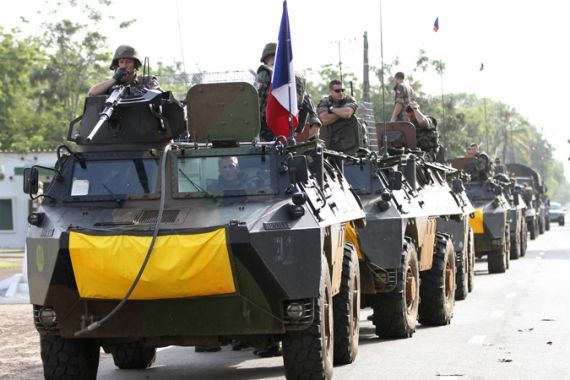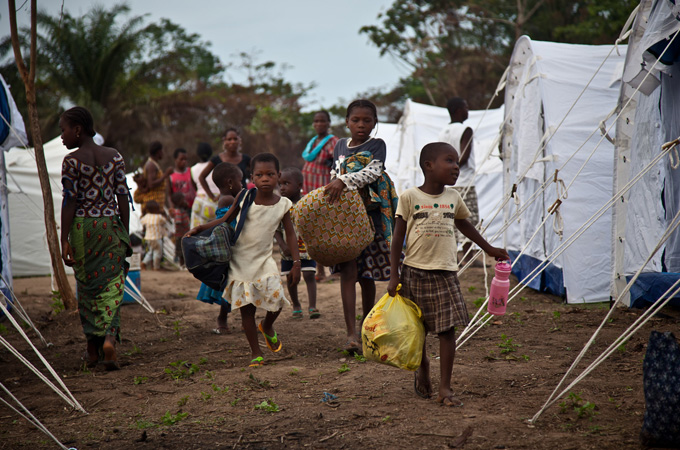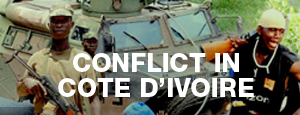EU mulls easing Cote d’Ivoire sanctions
Move follows request by internationally recognised leader seeking to alleviate humanitarian crisis in west African state

 |
| Tens of thousands of Ivorians have either sought refuge in neighbouring countries or have been displaced [EPA] |
The European Union is considering a request by Ivory Coast’s internationally recognised leader Alassane Ouattara to ease economic sanctions on the West African country, the body’s executive says.
The 27-member bloc imposed sanctions after Laurent Gbagbo, the incumbent president, refused to relinquish power to Ouattara who is recognised by the United Nations, the African Union and the west African economic bloc, ECOWAS, as the winner of last November’s presidential runoff.
The sanctions to be lifted include those on two ports and on the cocoa trade, the mainstay of the world’s largest grower.
“We’ve received a request from President Ouattara to remove certain entities from the sanctions list,” a spokesman for the EU’s foreign affairs chief, Catherine Ashton, said.
 |
| Click here for more on our special coverage |
“We are working on this in close consultation with President Ouattara, and hope to be able to begin easing the sanctions soon.”
In a televised speech on Thursday, Ouattara said he had asked the EU to ease sanctions “on the ports of Abidjan and San Pedro and certain public entities”.
“I have also asked the central bank BCEAO to reopen its branches in Ivory Coast, to ensure a resumption of operations in all banks so as to enable the payment of salaries and arrears in the shortest possible time,” he said on television channel LCI.
The developments will be a huge relief to thousands of Ivorians in Abidjan who are facing an acute shortage of basic supplies. Tens of thousands of people have had to seek refuge in neighbouring Liberia.
Al Jazeera’s Haru Mutasa, reporting from Abidjan on Friday, said that “goods like food and medicine will undoubteldy improve the lives of ordinary citizens”.
She said gunfire continue to echo through the country’s commercial capital where decomposing bodies litter some of the streets.
“It could be a long way before things turn to normal,” she said. “It feels like we’re in a ghost town. There are no people on the streets.”
Earlier the UN staff in Cote d’Ivoire said more than 100 bodies, some burned alive and others thrown down a well, had been found in the past 24 hours.
Fierce fighting
Rupert Colville, the UN human rights spokesperson, told a news briefing in Geneva on Friday that about 60 bodies were found in Guiglo, 15 bodies in the western town of Duekoue and about 40 in Bloloquin.
The announcement came as Ouattara vowed to restore security in the country following fierce fighting between his forces and those of Gbagbo.
A commander for the French military force in Cote d’Ivoire, Licorne (Unicorn), also said on Friday its troops would carry out mixed patrols with police and gendarmes loyal to Ouattara to restore security and rebuild infrastructure.
Diplomatic and military efforts to oust Gbagbo this week were met with fierce resistance and Ouattara said his rival’s residence had been sealed off to protect the area.
| The battle for Abidjan |
|
|
Gbagbo remained defiant on Thursday, even after air strikes hammered his military bases and the palace, where he is holed up with his wife inside a subterranean tunnel.
And a man who has been Gbagbo’s friend for decades said the president may prefer to die than live in ignominy.
“I don’t think he will accept the destitution,” Guy Labertit, author of two books on Cote d’Ivoire and a former African affairs adviser for France’s opposition Socialist party, told the Associated Press news agency.
“He wants to live but he doesn’t want to live humiliated. That’s for sure.”
The November election was meant to draw a line under Cote d’Ivoire’s 2002-3 civil war, but the dispute over results rekindled it, turning Abidjan into a war zone.
Through a spokesman in Europe, Gbagbo continued to insist he had won the vote and stressed he would never leave the country he has ruled for the past 10 years.
“I reached the head of state and his wife less than an hour ago and no – he will not surrender. President Gbagbo will not cede,” said his adviser Toussaint Alain by telephone from Paris.
“It’s a question of principle. President Gbagbo is not a monarch. He is not a king. He is not an emperor. He is a president elected by his people.”